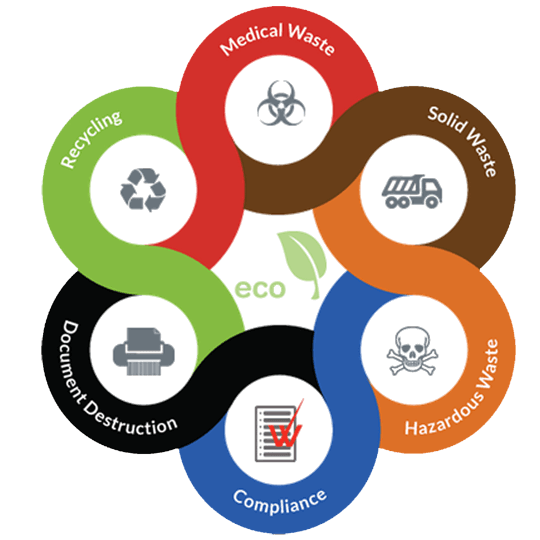Accountable Solutions: Comprehending Medical Waste Disposal Provider
In the world of healthcare, the appropriate disposal of clinical waste is a vital facet that demands mindful consideration. As healthcare facilities create various types of waste that need customized handling, understanding the subtleties of medical waste disposal services is extremely important.
Relevance of Proper Medical Garbage Disposal
Appropriate medical garbage disposal is essential in preserving a hygienic and safe environment within healthcare centers. In medical care setups, numerous kinds of waste are produced daily, consisting of contagious materials, sharps, expired medications, and chemical compounds. If not properly taken care of, these wastes can posture significant threats to both medical care workers and the basic public. Inappropriate disposal can bring about the spread of infections, injuries from sharps, contamination of water sources, and injury to the setting.

Types of Medical Waste
Within healthcare centers, a diverse variety of waste products classified as clinical waste is produced, each calling for certain handling and disposal techniques. Pathological waste, which includes cells, organs, and body components, demands proper disposal to respect the dignity of the deceased and protect against any type of biohazards. Comprehending the different types of clinical waste is critical for health care facilities to apply efficient waste management methods and secure public wellness and the environment.
Rules and Conformity
Health care centers need to follow stringent laws relating to the handling and disposal of medical waste to make sure compliance with lawful requirements and secure public health. These regulations are established to protect against the spread of infections, secure the setting, and maintain the security of medical care workers and the basic public. Numerous governing bodies, such as the Environmental Security Firm (EPA), the Occupational Safety and Health And Wellness Administration (OSHA), and the Division of Transportation (DOT), have particular standards that healthcare centers have to follow.
To follow these guidelines, healthcare facilities should effectively set apart, store, transport, and take care of different sorts of medical waste. This includes sharps waste, contagious waste, harmful waste, and pharmaceutical waste, each requiring particular managing treatments. Facilities needs to additionally keep exact documents of waste generation and disposal to show compliance throughout evaluations.
Non-compliance with clinical waste policies can lead to serious charges, fines, and damage to the facility's track record. It is necessary for medical care facilities to stay educated concerning the most current guidelines and implement robust compliance actions to shield public health and the environment.
Advantages of Specialist Disposal Solutions
Involving specialist medical waste disposal solutions supplies healthcare centers a reliable and reliable service for taking care of harmful products. By outsourcing this essential task to specialists, medical care facilities can guarantee conformity with guidelines while focusing on providing high quality care to clients. One of the vital benefits of specialist disposal services is the competence they bring to the table. These solutions employ experienced experts who are skilled in handling various kinds of clinical waste, guaranteeing correct partition, transportation, product packaging, and disposal.
Additionally, professional disposal services use modern equipment and follow industry ideal methods to minimize environmental effect and reduce the risk of contamination. This not just promotes a more secure work atmosphere for health care personnel however additionally adds to total public wellness and safety and security. In addition, contracting out clinical garbage disposal can result in set you back financial savings in the future by eliminating the demand for internal administration and disposal systems.
Sustainable Practices in Healthcare

One trick lasting method in medical care is waste read what he said reduction. By applying Clicking Here techniques to reduce unnecessary packaging, single-use items, and overall waste generation, medical care facilities can dramatically decrease the amount of waste sent out to landfills or incineration. In addition, reusing programs for materials like plastic, glass, and paper can further minimize the ecological effect of medical care procedures.

Conclusion
In conclusion, correct clinical garbage disposal is critical in keeping a healthy and balanced and risk-free setting for both medical care workers and the public. Comprehending the various kinds of medical waste, adhering to policies and conformity requirements, and utilizing specialist disposal services are necessary steps in liable waste administration. By adopting lasting methods in healthcare centers, we can reduce ecological impact and ensure the wellness of all people associated with the healthcare sector.
As healthcare centers create numerous types of waste that need specialized handling, comprehending the visit homepage subtleties of clinical waste disposal solutions is critical.Within medical care centers, a varied array of waste products identified as medical waste is created, each needing details handling and disposal methods. Comprehending the numerous types of clinical waste is essential for medical care centers to carry out effective waste administration approaches and protect public health and wellness and the environment.
By executing strategies to minimize unneeded packaging, single-use products, and general waste generation, medical care facilities can substantially lower the amount of waste sent to land fills or incineration. Understanding the different types of clinical waste, following laws and conformity standards, and using professional disposal services are crucial actions in responsible waste management.